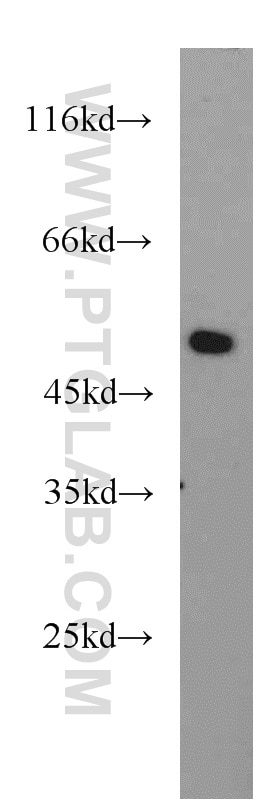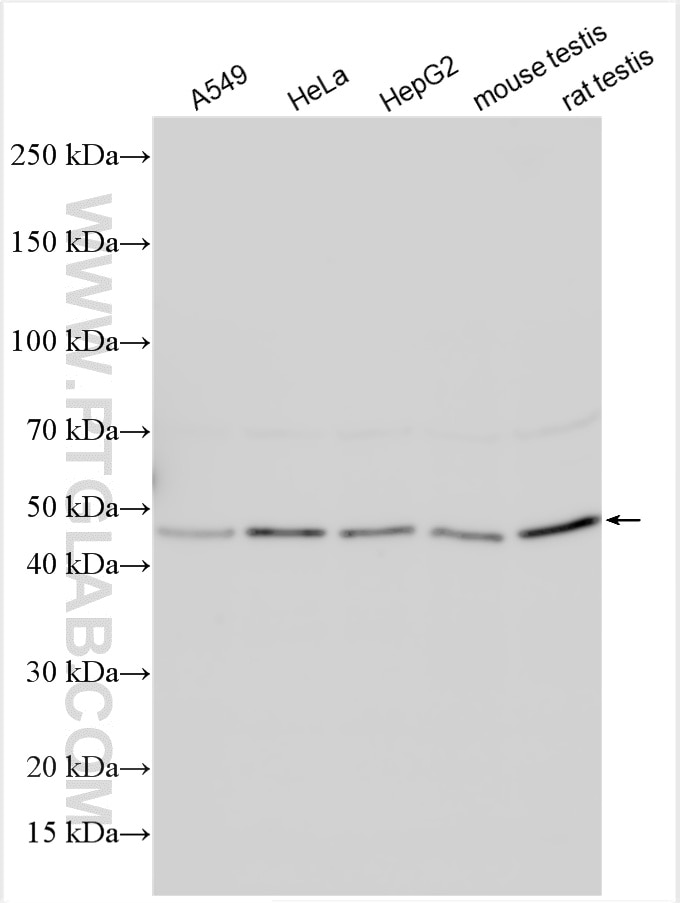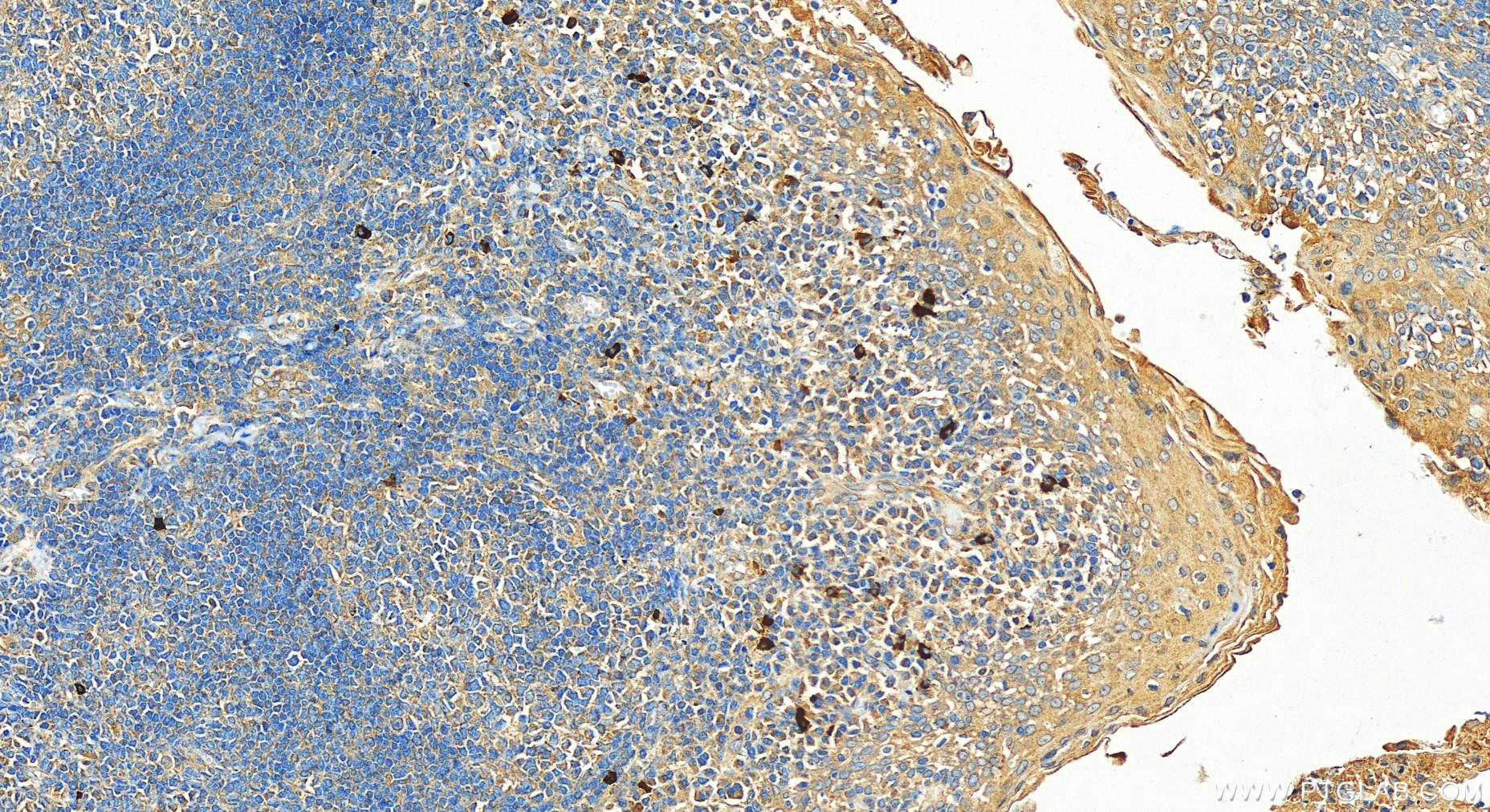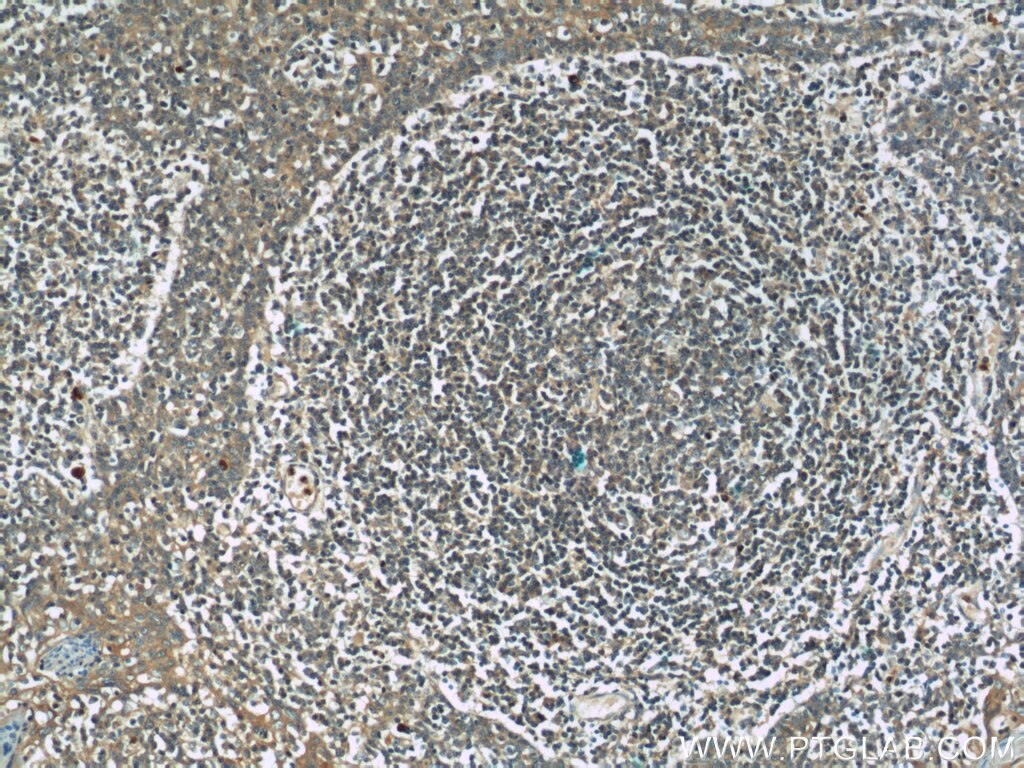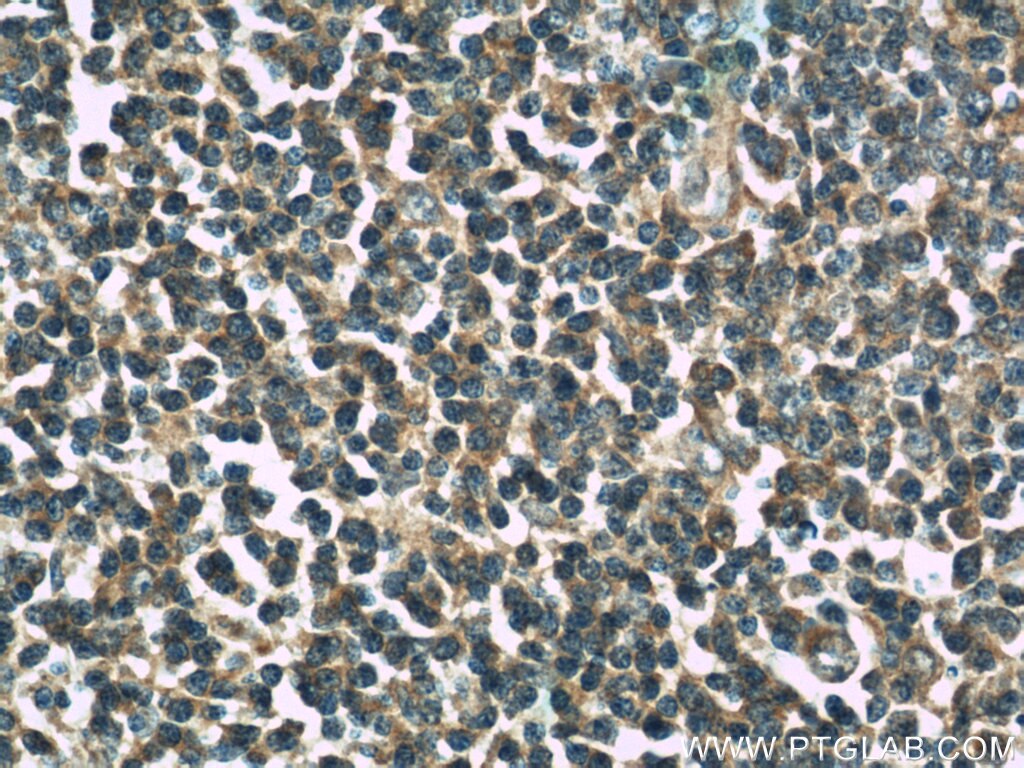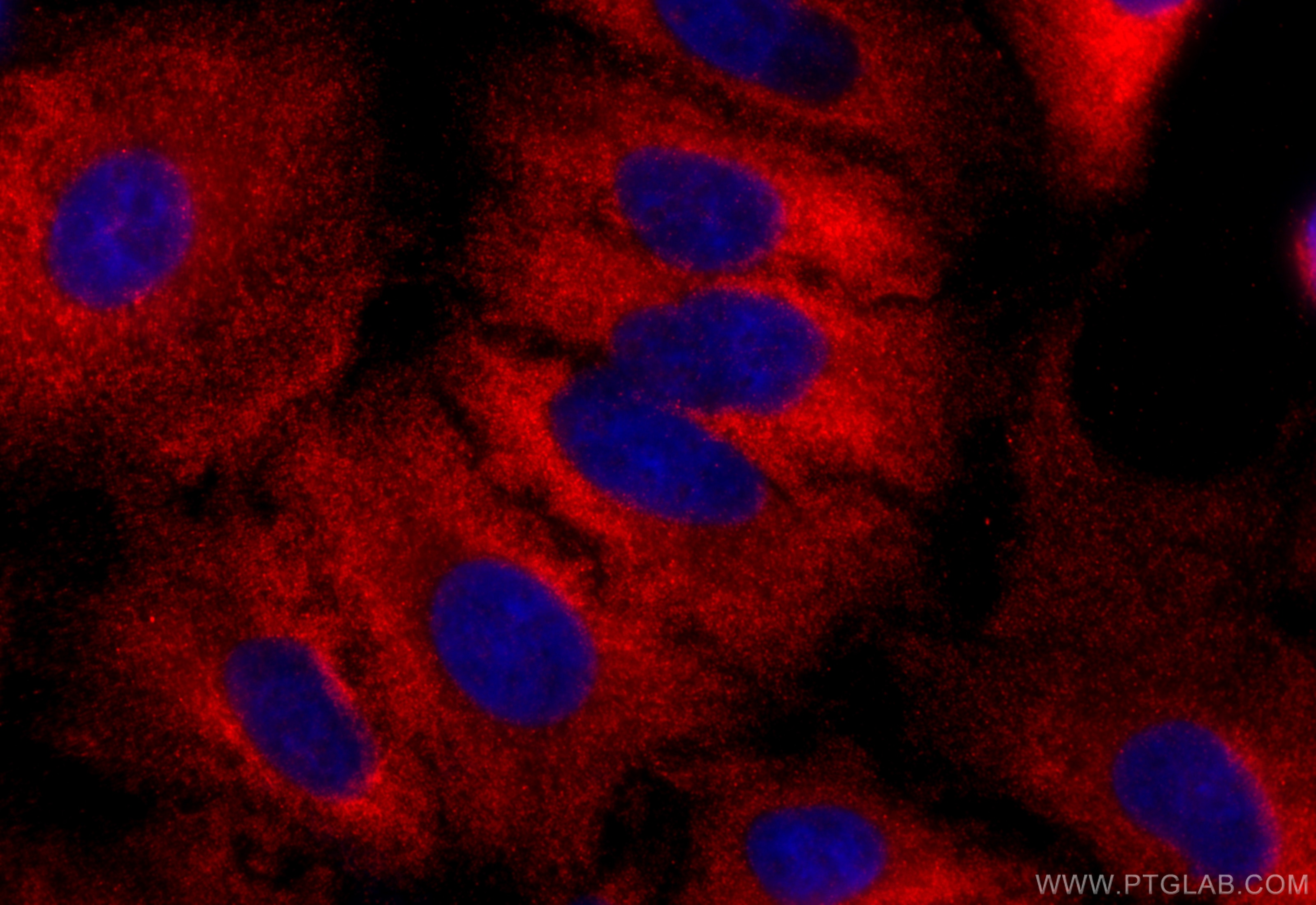BPIL1 Polyklonaler Antikörper
BPIL1 Polyklonal Antikörper für WB, IHC, IF/ICC, ELISA
Wirt / Isotyp
Kaninchen / IgG
Getestete Reaktivität
human, Maus, Ratte
Anwendung
WB, IHC, IF/ICC, ELISA
Konjugation
Unkonjugiert
Kat-Nr. : 13461-2-AP
Synonyme
Geprüfte Anwendungen
| Erfolgreiche Detektion in WB | A549-Zellen, HeLa-Zellen, HepG2-Zellen, Maushodengewebe, Rattenhodengewebe |
| Erfolgreiche Detektion in IHC | humanes Tonsillitisgewebe Hinweis: Antigendemaskierung mit TE-Puffer pH 9,0 empfohlen. (*) Wahlweise kann die Antigendemaskierung auch mit Citratpuffer pH 6,0 erfolgen. |
| Erfolgreiche Detektion in IF/ICC | A549-Zellen |
Empfohlene Verdünnung
| Anwendung | Verdünnung |
|---|---|
| Western Blot (WB) | WB : 1:500-1:2000 |
| Immunhistochemie (IHC) | IHC : 1:800-1:3200 |
| Immunfluoreszenz (IF)/ICC | IF/ICC : 1:200-1:800 |
| It is recommended that this reagent should be titrated in each testing system to obtain optimal results. | |
| Sample-dependent, check data in validation data gallery | |
Veröffentlichte Anwendungen
| WB | See 2 publications below |
| IHC | See 2 publications below |
Produktinformation
13461-2-AP bindet in WB, IHC, IF/ICC, ELISA BPIL1 und zeigt Reaktivität mit human, Maus, Ratten
| Getestete Reaktivität | human, Maus, Ratte |
| In Publikationen genannte Reaktivität | human |
| Wirt / Isotyp | Kaninchen / IgG |
| Klonalität | Polyklonal |
| Typ | Antikörper |
| Immunogen | BPIL1 fusion protein Ag4051 |
| Vollständiger Name | bactericidal/permeability-increasing protein-like 1 |
| Berechnetes Molekulargewicht | 458 aa, 49 kDa |
| Beobachtetes Molekulargewicht | 49 kDa |
| GenBank-Zugangsnummer | BC034415 |
| Gene symbol | BPIL1 |
| Gene ID (NCBI) | 80341 |
| Konjugation | Unkonjugiert |
| Form | Liquid |
| Reinigungsmethode | Antigen-Affinitätsreinigung |
| Lagerungspuffer | PBS with 0.02% sodium azide and 50% glycerol |
| Lagerungsbedingungen | Bei -20°C lagern. Nach dem Versand ein Jahr lang stabil Aliquotieren ist bei -20oC Lagerung nicht notwendig. 20ul Größen enthalten 0,1% BSA. |
Hintergrundinformationen
Bactericidal/permeability-increasing protein-like 1 (BPIL1, also known as LPLUNC2 or BPIFB2) is a member of the lipid transfer (LT)/lipopolysaccharide binding protein (LBP) family. LT/LBP proteins are structurally related proteins capable of binding phospholipids and lipopolysaccharides (PMID: 12185532). The gene of BPIL1 maps to Chromosome 20q11, and encodes a 458-amino acid protein with a calculated molecular weight of 49 kDa. It is highly expressed in hypertrophic tonsils. BPIL1 has been identified as a nasal mucous protein that may be involved in immune response in the nose against microbial infections (PMID: 15996010). Reduced expression of antimicrobial PLUNC proteins (LPLUNC1 and LPLUNC2) has been reported in nasal polyp tissues of patients with chronic rhinosinusitis (PMID: 22676062).
Protokolle
| PRODUKTSPEZIFISCHE PROTOKOLLE | |
|---|---|
| WB protocol for BPIL1 antibody 13461-2-AP | Protokoll herunterladen |
| IHC protocol for BPIL1 antibody 13461-2-AP | Protokoll herunterladenl |
| IF protocol for BPIL1 antibody 13461-2-AP | Protokoll herunterladen |
| STANDARD-PROTOKOLLE | |
|---|---|
| Klicken Sie hier, um unsere Standardprotokolle anzuzeigen |
Publikationen
| Species | Application | Title |
|---|---|---|
Allergy Reduced expression of antimicrobial PLUNC proteins in nasal polyp tissues of patients with chronic rhinosinusitis. | ||
J Proteome Res Proteomic analysis of human bronchoalveolar lavage fluid after subsgemental exposure. | ||
J Immunol Res Reduced Expression of Antimicrobial Protein Secretory Leukoprotease Inhibitor and Clusterin in Chronic Rhinosinusitis with Nasal Polyps. |
